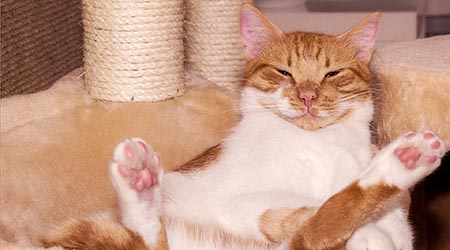How to Avoid Dental Problems in Cats
When it comes to cat dental care it’s a common misconception that cats require less maintenance or are somehow more self-sufficient. In contrast, statistics show that 80% of cats over the age of 3 will suffer from some degree of tooth or gum related problems when plaque is left to build up and not kept under control ( Source: Manhattan Cat Specialists ).
How Do I Care for My Cats’ Teeth to Avoid Any Problems?
Fortunately, there are a few things we can do to maintain our cat’s dental health. Now you will probably be a bit shocked when I say brush your cats’ teeth daily- that would be the ideal scenario but it’s not always possible if you have a cat who is not accustomed to having their teeth brushed or doesn’t enjoy the attention of an oral hygienist! It’s important to try and clean your cats’ teeth at least twice a week to slow down the plaque buildup and to maintain healthy gums.
Cats easily accumulate bits of food, bacteria and plaque on the outside and in between their teeth which eventually hardens to form tartar. This irritates the gums and causes decay over time. Brushing twice a week helps to reduce this build-up and maintains a healthy oral environment.
It is very important to note that you should only use specific cat toothpaste and not human toothpaste. Cat toothpaste is fluoride-free, unlike human toothpaste which can be toxic for cats. Only use a recommended and specifically formulated toothpaste for cats.
A quick visual inspection should give you an indication of your cat’s overall oral health. Their teeth should be
- Clean and white
- Gums should be pink with no signs of redness or swelling
- Breath should smell neutral
Our cat companions are not able to tell us if they have tooth pain so be on the lookout for any visual cues like difficulty swallowing, not drinking, changes to their weight, excessive drooling or changes in eating patterns may indicate they are suffering from gum or tooth pain.
What If I Can’t Brush My Cats Teeth?
Some cats just don’t tolerate brushing, so if physically brushing the teeth is a distressing experience for you or your cat there are dietary options that can be considered. Below are some of the most effective and recommended oral care dietary options.
Royal Canin Dental is a specifically designed diet for cat’s and formulated for optimum dental care. The small dry kibble helps to reduce tartar formation by up to 59% if fed exclusively and forms part of an oral maintenance plan. Royal Canin Dental is a really good option because it’s not only a nutritionally balanced diet it contains dental agents to help maintain healthy teeth and gums.
Greenies are another great option to help keep your cats’ teeth clean. A Greenie is a dry biscuit or dental treat used to scrub the surface of the tooth clean. It’s specifically formulated to prevent the buildup of plaque and the texture of these treats help to scrub away any loose debris. Greenies are typically more easily accepted because it’s available in a few tasty flavours.
Water additives are another way to help maintain a regular dental hygiene routine. A specifically formulated ‘mouth wash’ can be added into their water, that helps to reduce the microbial flora in the oral cavity.
If your cat suffers from any oral or dental conditions, we recommend checkups at your dental vet every six months to provide preventative care and maintenance.
Can I Give My Cat Raw Bones For Its Teeth?
In the wild, cats would usually be able to clean their teeth by chewing on grass or bones but there is a bit of controversy surrounding the theory of giving cats raw bones. We consider giving cats bones as a method to help clean the teeth a health risk. We do not recommend raw or cooked bones as some animals can pick up infections like salmonella and bones can easily cause intestinal obstructions resulting in serious injuries, in some cases fatal.
Optimum Oral Health Care For Cats
To establish a regular fuss-free tooth cleaning routine, try and start when your cat is young. You know the saying you can’t teach an old dog new tricks, well try brushing an older cats’ teeth! Get them used to having your fingers in their mouth and use a treat to encourage the brushing motion. Regular brushing routines will help them feel more relaxed and accustomed to a more regular brushing regime.
For more information contact your friendly Adelaide vets at Port Road Vet.

